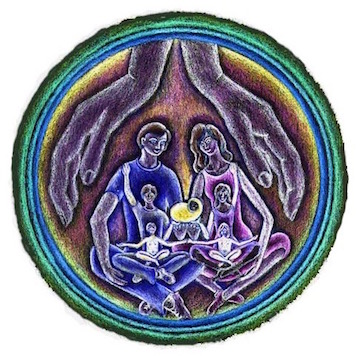Developing The Habit Of Loving
By Dr. Margaret PaulJuly 25, 2016
Like anything worth learning, developing the habit of loving takes practice. As you practice Inner Bonding, your brain develops the habit of loving.
"We are what we repeatedly do. Excellence, then, is not an act, but a habit." ~ Aristotle
 All of us develop habits as we are growing up. Some of the habits are positive, such as the habits of being on time, being organized and being honest. But some habits can cause us many problems, both with ourselves and with others.
All of us develop habits as we are growing up. Some of the habits are positive, such as the habits of being on time, being organized and being honest. But some habits can cause us many problems, both with ourselves and with others.
Please take a moment right now to think about whether you are in the habit of abandoning yourself, or you are in the habit of loving yourself and sharing your love with others.
- When you have painful feelings, what is your habit? Do you stay in your head, ignoring your feelings? Do you judge yourself for your feelings? Do you graze in front of the refrigerator, grab a drink, turn on the TV or turn to other addictions? Do you blame someone?
These behaviors are the habit of self-abandonment rather than self-love. By consistently practicing Inner Bonding, you can develop the habit of self-love. As Aristotle said in the above quote, "We are what we repeatedly do." As you repeat the Inner Bonding process, moving toward your feelings with a compassionate intent to learn, you will develop the habit of loving yourself.
- When you are with others, what is your habit? Do you hold back, waiting to see if you are accepted? Do you pull on others for attention and approval? Do you act overly 'nice' – giving to get love? Do you talk on and on and keep bringing the conversation back to yourself?
These behaviors come from the habit of self-abandonment. You are trying to get the attention and approval from others that you need to be giving to yourself.
The more you practice Inner Bonding and learn to fill yourself with love, the more love you will have to share with others. Then you can practice being warm and accepting of others and being interested in who they are and what they say. You will be able to give for the joy of giving instead of giving to get.
Most of us grew up with the habit of protecting, controlling and avoiding with various forms of controlling and self-abandoning behavior. These habits are deeply ingrained in the brain and are not easy to change – but you CAN change them with practice. With enough practice, new brain pathways can be established. Just as new brain pathways were created as you learned to drive a car, your brain can be rewired to love yourself and others rather than continue to avoid and control. But it does take much more practice to develop the habit of loving than it does to develop the habit of driving a car.
This is why I encourage you to start your day with tuning into your feeling and attending to any unease inside. Then practice staying in Step One throughout the day, practicing staying tuned in to your body so that you know the moment you are feeling anything other than peace and fullness inside. It takes a lot of practice to remember to focus in your body rather than in your head. And it takes a lot of practice to turn toward your feelings and embrace them with a compassionate intent to learn, rather than avoid them.
With consistent daily practice, you will develop the habit of loving yourself and others. The key to doing this practice is finding the place in you that WANTS to be loving more than you want to keep abandoning yourself. We do what we want to do, so when love has a higher priority to you than controlling and avoiding, you will be motivated to make Inner Bonding a lifetime practice. Just as being a great musician takes an on-going practice, so does Inner Bonding.
Join Dr. Margaret Paul for her 30-Day at-home Course: "Love Yourself: An Inner Bonding Experience to Heal Anxiety, Depression, Shame, Addictions and Relationships."
Join Dr. Margaret Paul for her 30-Day at-home Relationships Course: "Loving Relationships: A 30-Day Experience with Dr. Margaret Paul - For people who are partnered and people who want to be partnered."
Join IBVillage and receive compassionate help and support for your healing journey.
 Send this article to a friend
Send this article to a friend  Print this article
Print this article  Bookmarked 2 time(s)
Bookmarked 2 time(s)
| Related Articles |
|---|
| Exercising Your Loving Adult |
| Developing a Loving Adult |
| Are You Loving Yourself Enough? |
| Becoming A Loving Adult |
| Controlling Behavior, Loving Behavior |
Comments
| Author | Comment | Date |
|---|---|---|
| Join the Inner Bonding Community to add your comment to articles and see the comments of others... | ||

Daily Inspiration
Mandy was my finest dog. In every visit in our memories she still teaches me. Loyalty is the finest part of being.
By Dr. Erika Chopich

 Share with Del.icio.us
Share with Del.icio.us Share with Digg
Share with Digg







